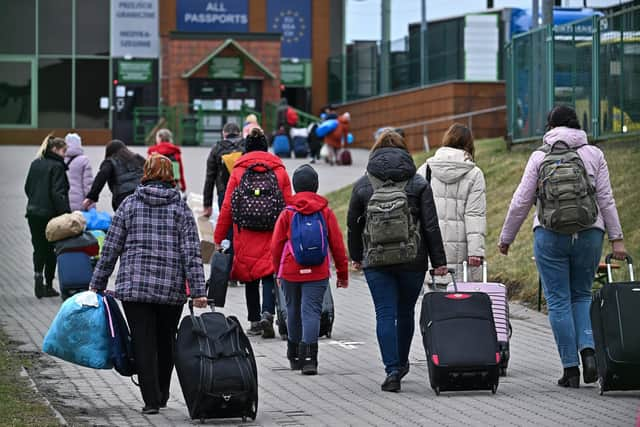Ukraine: In the darkest of times, people are creating hope - Michael Mosselmans
Christian Aid has more than 70 years’ experience of working in partnership to support communities to thrive.
Principally, we tackle the root causes of poverty so that women, men and children the world over are strengthened against future knocks.
Advertisement
Hide AdAdvertisement
Hide AdBut if disasters happen, we get people the help they want straight away.


According to the Disasters Emergency Committee, more than £300m raised means that around £3 on average has been donated by every person in the UK.
My job is to make sure the donations go to where they are most needed, quickly and effectively.
Christian Aid’s immediate mission over the next six months is to spend £8m from our share of the Ukraine Humanitarian Appeal.
Advertisement
Hide AdAdvertisement
Hide AdOur objective: to focus humanitarian aid in Ukraine on where it will have the most impact. So far, so obvious. But not so simple.
Like many humanitarian charities, Christian Aid didn’t have teams on the ground in Ukraine when war broke out.
But that hasn’t stopped us from responding rapidly by working with our existing network of local partners with the right relationships in Ukraine.
For example, we gave £2m to Crown Agents development agency last month to spend on life-saving medical supplies to Ukraine.
Advertisement
Hide AdAdvertisement
Hide AdThey have now delivered first-aid trauma kits for civilians, oxygen concentrators and baby incubators.
We have also been working closely with another two partners – Hungarian Interchurch Aid in the western border area and their Swiss equivalent, known as HEKS (Swiss Church Aid), to the east and south of Ukraine.
Right from the start of the war, they’ve been setting up shelters and providing food, together with other essential items like sanitary products.
Amid the carnage of war, it always fills me with hope when I see how people – like in previous emergencies around the world – support their neighbours, communities and complete strangers.
Advertisement
Hide AdAdvertisement
Hide AdFor example, our team in Lviv has been working with a former dance therapist, Olga, who is in her mid-20s.
Like many others, she has dropped her previous life to become what we call “accidental humanitarians”.
Christian Aid does not impose our outside solution on people like Olga.
Instead we try to sustain these local-led initiatives. We do this through cash transfers to our partners so they can quickly react and adapt to whatever refugees and those who stay in Ukraine need most.
It could be nappies, baby food or bin liners.
So what’s the next step?
Advertisement
Hide AdAdvertisement
Hide AdWe are ready to respond to acute needs that become apparent over time, like upgrading existing infrastructure to cope with the influx of displaced people.
For example, in the government-run communal shelters where mainly women and children are housed, we are planning to provide additional washing and sanitation facilities for older people and for people with disabilities, as well as individual hygiene kits. depending on their needs.
Furthermore, host communities and refugees both need support.
Through our partners, we will provide basic household items so that refugees are able to function in their new environment and bring
Advertisement
Hide AdAdvertisement
Hide Adpeople together as hospitality evolves into longer-term refugee hosting.
The protection of vulnerable displaced people is central to humanitarian action and this response is no different.
To this end, we have distributed 5,000 SIM cards so that families can keep in touch and established safe zones at train stations to ensure women and children are not exploited by predatory gangs of people traffickers.
Many challenges remain.
The latest assault by Russian forces might mean another surge of refugees heading west.
Advertisement
Hide AdAdvertisement
Hide AdIt’s not just the risk from Russian attacks but also navigating Ukraine’s martial law and getting humanitarian aid licences. A crisis like this can seem overwhelming and hopeless.
But then I think about people like you who have donated what you can and people like Olga who has thrown herself, body and soul, into her new life, helping strangers.
As the chair of Christian Aid and former Archbishop of York John Sentamu said recently: “Like the people of Ukraine, looking out for their neighbours or the charity workers delivering emergency food to people seeking refuge, we must bring hope.”
Even in these darkest of times, people are creating hope.
Whether it’s Ukraine, Afghanistan, Ethiopia or Bangladesh, when lots of people unite and make a small effort, it can lead to big change.
This is what keeps inspiring me to do my job.
Thank you.
Michael Mosselmans is Head of the Humanitarian Division at Christian Aid.